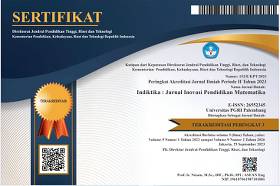METODE QUANTUM LEARNING DAN KEMAMPUAN BERPIKIR KREATIF MATEMATIS SISWA SMP NEGERI 5 SEKAYU
DOI:
https://doi.org/10.31851/indiktika.v2i2.4153Abstract
ABSTRAK
Penelitian ini bertujuan untuk mengetahui pengaruh metode Quantum Learning terhadap kemampuan berpikir kreatif dalam pembelajaran matematika di SMP Negeri 5 Sekayu. Metode penelitian yang digunakan adalah metode eksperimen dengan menggunakan posstest-only control design. Populasi dalam penelitian ini adalah siswa kelas VII SMP Negeri 5 Sekayu dan sampel yang digunakan adalah siswa kelas VII.2 sebagai kelas eksperimen dan kelas VII.1 sebagai kelas kontrol. Penelitian ini berlangsung mulai tanggal 18 September 2019 sampai 4 Oktober 2019. Teknik pengumpulan data menggunakan tes yang dilakukan pada akhir pembelajaran. Teknik analisis data menggunakan uji t. Berdasarkan analisis data nilai signifikan uji t yaitu 0,001 kurang dari angka kritis 0,025, sehingga dapat disimpulkan bahwa metode Quantum Learning berpengaruh positif terhadap kemampuan berpikir kreatif siswa kelas VII SMP Negeri 5 Sekayu.
Kata kunci : quantum learning, berpikir kreatif
Â
Â
ABSTRACT
This study aims to determine the effect of the Quantum Learning method on the ability to think creatively in mathematics learning at Sekayu 5 Middle School. The research method used was an experimental method using a post-test-only control design. The population in this study were students of class VII of SMP Negeri 5 Sekayu and the sample used was students of class VII.2 as the experimental class and class VII.1 as the control class. This research conducted on 18 September 2019 to 4 October 2019. Data collection techniques used were tests conducted at the end of learning. Data analysis techniques used t-test. Based on the data analysis the significant value of the t-test is 0.001 less than the critical number of 0.025, so it can be concluded that the Quantum Learning method has a positive effect on the creative thinking ability of Grade VII students of SMP Negeri 5 Sekayu.
Keywords : quantum learning, creative thinking
References
Anisa, Medriati, R., dan Putri, D.H. 2019. Pengaruh Model Quantum Learning terhadap Pemahaman Konsep dan Hasil Belajar Siswa Kelas X. Jurnal Kumparan Fisika, Vol. 2(3) : 201-208.
Astuti, W. 2017. Model Quantum Learning untuk Meningkatkan Hasil Belajar Pecahan. Briliant: Jurnal Riset dan Konseptual, Vol. 2(2) : 124-129.
DePorter, B. dan Hernacki, M. 2007. Quantum Learning: Membiasakan Belajar Nyaman dan Menyenangkan. Bandung: Penerbit Kaifa.
Fatahuddin, S. 2011. Penerapan Metode Quantum Learning Sebagai Upaya Peningkatan Prestasi Belajar Siswa pada Mata Diklat Penerapan Konsep Dasar Listrik dan Elektronika (PKDLE) di SMKN 2 Surakarta. Skripsi tidak diterbitkan. Yogyakarta: Program Studi Pendidikan Teknik Mekatronika Universitas Negeri Yogyakarta. [Online]. Tersedia : https://eprints.uny.ac.id /39224/1/Sholhan%20Fatahuddin%20-%2006518241008.pdf. [26 april 2018].
Mardianto. 2012. Psikologi Pendidikan. Medan: Perdana Publishing.
Munandar, U. 1999. Mengembangkan Bakat dan Kreativitas Anak Sekolah. Jakarta: Rineka Cipta.
Pane, A. 2014. Peningkatan Kemampuan Berpikir Kreatif Siswa dengan Menerapkan Model Pembelajaran Quantum Learning Materi Sains. Jurnal Logaritma, Vol. 2(1) : 1-13.
Samad, I. 2017. Peningkatan Hasil Belajar Matematika Melalui Pembelajaran Quantum Learning. Jurnal Pedagogy, Vol. 2(1) : 20-30.
Saputro, T. dan Latifah, S. 2018. Efektivitas Metode Pembelajaran Quantum Learning terhadap Kemampuan Berpikir Tingkat Tinggi Peserta Didik Kelas X MA Nurul Islam Gunung Sari Ulubelu Tanggamus. Indonesian Journal of Science and Mathematics Education, Vol. 1(2) : 29-37.
Siswono, T.Y.E. 2006. Implementasi Teori tentang Tingkat Berpikir Kreatif dalam Matematika. Makalah Pada Prosiding Seminar Konferensi Nasional Matematika XIII dan Konggres Himpunan Matematika Indonesia di Jurusan Matematika FMIPA Universitas Negeri Semarang, Semarang, 24-27 Juli 2006.
Sudarman, S.W. dan Vahlia, I. 2016. Efektifitas Penggunaan Metode Pembelajaran Quantum Learning terhadap Kemampuan Pemahaman Konsep Matematis Mahasiswa. Al-Jabar: Jurnal Pendidikan Matematika, Vol. 7(2) : 275-282.
Sugiyanto. 2009. Model-model Pembelajaran Inovatif. Surakarta: Mata Padi.
Suryadi, D. dan Herman, T. 2008. Eksplorasi Matematika Pembelajaran Pemecahan Masalah. Jakarta: Karya Duta Wahana.
Swandewi, N.L.P., Gita, I.N., dan Suarsana, I.M. 2019. Pengaruh Model Quantum Learning Berbasis Masalah Kontekstual Terhadap Kemampuan Berpikir Kreatif Siswa SMA. Jurnal Elemen, Vol. 5(1) : 31-42.
Downloads
Published
Issue
Section
License
This work is licensed under a Creative Commons Attribution-ShareAlike 4.0 International License.
Authors who publish with this journal agree to the following terms:
- Authors retain copyright and grant the journal right of first publication with the work simultaneously licensed under a Creative Commons Attribution License that allows others to share the work with an acknowledgement of the work's authorship and initial publication in this journal.
- Authors are able to enter into separate, additional contractual arrangements for the non-exclusive distribution of the journal's published version of the work (e.g., post it to an institutional repository or publish it in a book), with an acknowledgement of its initial publication in this journal.
- Authors are permitted and encouraged to post their work online (e.g., in institutional repositories or on their website) prior to and during the submission process, as it can lead to productive exchanges, as well as earlier and greater citation of published work.













